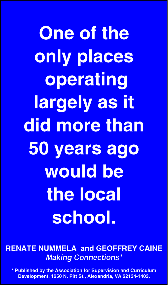
................. in "education" the change is slow to come. Californian educationalists Renate Nummela Caine and Geoffrey Caine explain in their book Making Connections: teaching and the human brain: "One function of schooling should be to prepare students for the real world. They need to have a sense of what will be expected of them, how they will be challenged, and what they are capable of doing. The assumption is that, by and large, schooling as we know it meets those goals. The reality is that it does not. On the contrary, it fosters illusions and obscures the real challenges. In particular, it fails to deal with the impact of electronic media.
"Take a close look at American teenagers. For a moment, let time run backwards to deprive teenagers of gadgets that are in some way dependent on electricity. One by one, we remove the television, the CD players, the computer, the videodisc, the radio, tape player, record player, electronic games, aeroplanes, air conditioning and automatic heating, shopping in large malls, and the opportunity to acquire large numbers of possessions. How well do you think our teenagers would cope? How would their lives be different? And what about our own?
"One of the only places that would reflect scarcely any difference in the scenario we've painted - and that would be operating largely as it did more than 50 years ago - would be the local school."
Obviously that criticism does not apply to those schools that are rapidly changing, and encouraging students to take control of their own world. But does it not apply to most?
Our own view is that more and more learning will become self-learning: self-directed and self-fulfilling........
[excerpt from "The Learning Revolution" by Gordon Dryden and Jeannette Vos]
What does that say for the schools of tomorrow? Shouldn't they be here today before tomorrow is past? And what model do we use?

0 Comments:
Post a Comment
<< Home